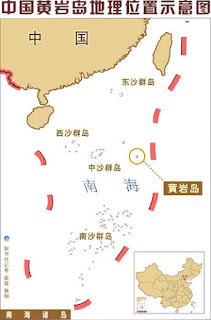BEIJING: China pledged Friday to make joint efforts with the Association of Southeast Asian Nations (ASEAN) to safeguard regional peace and stability after the 10-member bloc issued a six-point statement on the South China Sea.
"The Chinese side is willing to work together with the ASEAN members to implement the Declaration on the Conduct of Parties in the South China Sea (DOC) comprehensively and effectively," Chinese Foreign Ministry spokesman Hong Lei said in response to a question on the ASEAN statement.
In the statement issued earlier on Friday, the ASEAN members reaffirmed their commitment to the "peaceful resolution of disputes" in the South China Sea. Analysts said the six-point principles were reached to make up for the lack of a customary communique after a foreign ministers' meeting last week.
In an unprecedented development, the 45th Foreign Ministers' Meeting of the ASEAN was not wrapped up with the release of a communique showcasing common ground.
ASEAN groups Brunei, Cambodia, Indonesia, Laos, Malaysia, Myanmar, the Philippines, Singapore, Thailand and Vietnam.
Qu Xing, head of the China Institute of International Studies, told Xinhua that it was Vietnam and the Philippines that should be blamed for the failure to pass a communique last week.
"The two countries attempted to turn the disputes between them and China into a problem between China and ASEAN as a whole," he said, "which was unacceptable for the other members of the bloc."
"The Chinese side has noticed the ASEAN's statement on the South China Sea (on Friday)," Hong said, adding that the core problem of the South China Sea was the disputes over the sovereignty of the Nansha islands and the demarcation of the islands' adjacent waters.
"China has sufficient historical and jurisprudential evidence for its sovereignty over the Nansha islands and the adjacent waters," he added.
However, Hong said China is open to consultations with the ASEAN on the conclusion of a Code of Conduct in the South China Sea.
"(We) hope that all the parties will strictly abide by the DOC and create necessary conditions and atmosphere for the consultations," he said.
As a signatory to the United Nations Convention of the Law of the Sea (UNCLOS), China attaches importance to safeguarding the principles and mission of the Convention, said the spokesman.
Hong said UNCLOS is aimed to establish a legal order for the seas and oceans "with due regard for the sovereignty of all States," and it does neither serve as an international treaty to address disputes over territorial sovereignty between states nor as evidence used to judge over the disputes.
The countries concerned should address the disputes over the maritime demarcation in the South China Sea, after the land disputes have been resolved, in accordance with historical facts and all international laws including UNCLOS, he added.
"China attaches importance to its ties with the ASEAN," Hong said, adding the country is committed to promoting friendly neighborhood and reciprocal cooperation with the ASEAN to push ahead with the cooperation in East Asia with joint efforts.
The spokesman said China and ASEAN share common interests and responsibilities in keeping Asia's development and maintaining regional peace and stability against the backdrop of the ongoing international financial crisis.
"The two sides should continue to promote their strategic communication in pursuit of a reciprocal and win-win situation, with mutual respect and trust in mind as well as handle the relationship between the two sides from strategic and long-term perspective," he added.
Related:
China to deploy military garrison in South China Sea
GUANGZHOU, July 20 (Xinhua) -- China's central military authority has approved to form and deploy a military garrison in the newly established city of Sansha.
Sources with the People's Liberation Army (PLA) Guangzhou Military Command said Friday that the Central Military Commission (CMC) had authorized it to form a garrison command in the city.Full story
ASEAN forum not proper platform to discuss South China Sea issue
BEIJING, July 11 (Xinhua) -- As the foreign ministers of the 27 participating parties of the ASEAN Regional Forum (ARF) meet in Phnom Penh on Thursday, many eye the talks as a platform to ease the tension over the South China Sea, which has flared up in recent months.
However, analysts say the attending parties are likely to be more interested in forging closer ties than focusing on differences that concern only a few members.Full story
Editor: Chen Zhi, Xinhua
Related post:
Asean has no reason to panic









